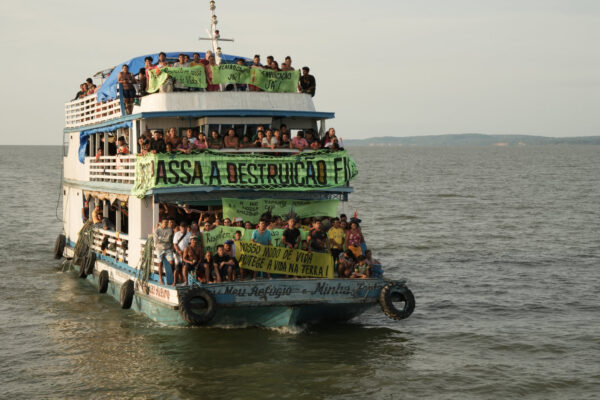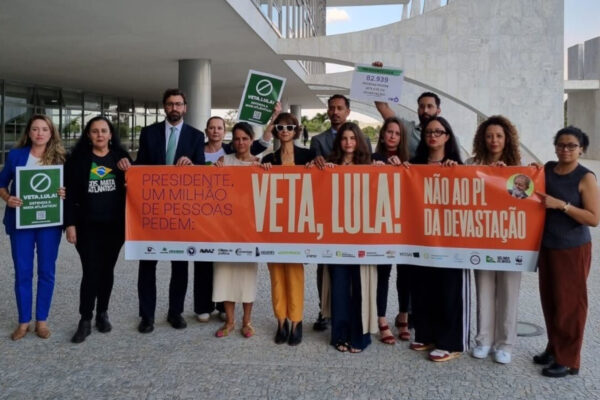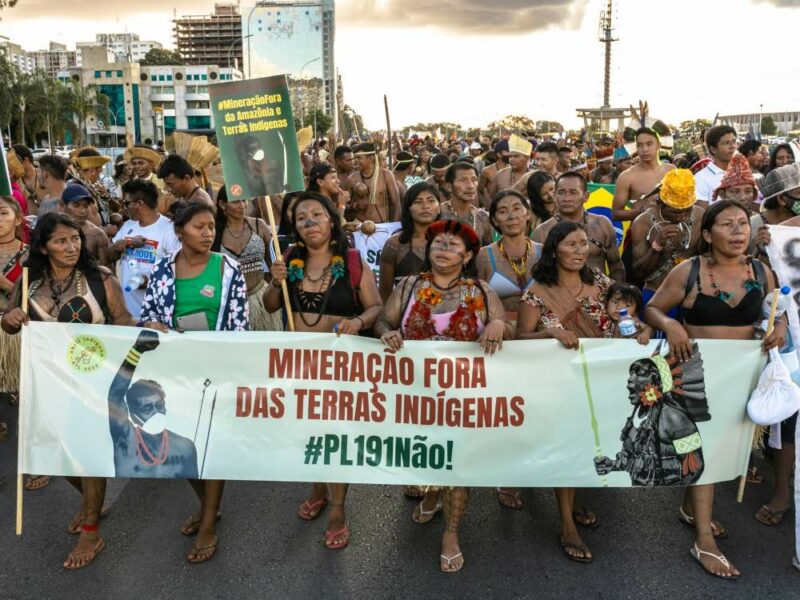On June 7, 2023, Brazil’s Supreme Court Justice Alexandre de Moraes cast a pivotal vote against the Marco Temporal or “Time Limit” legal thesis. Advanced by the country’s agribusiness interests, the thesis would curtail the rights of Indigenous peoples to lands they occupied or claimed prior to October 5, 1988, when the Brazilian Constitution was enacted. While the Court’s ruling was tilting against the thesis, proceedings came to a halt when Justice André Mendonça requested additional time for case analysis, a legal maneuver known in Brazil as “pedido de vista” (request to view). According to the Court’s rules, Mendonça now has 90 days to return the case for judgment, providing ample time for Brazil’s Senate to vote on pending legislation known as Bill 2903/2023 (formerly Bill 490/2023) that would advance the Marco Temporal and profoundly undermine the Indigenous right to land.
Bucking the traditional stance on the Marco Temporal argument, Justice Moraes’s vote proposed an alternative approach. He suggested that the federal government should compensate landowners situated within areas traditionally occupied by Indigenous peoples, but only if there’s no evidence of land usurpation, physical conflict, or legal disputes on the date the constitution was legally enacted. The subsequent deferral of the Court’s proceedings reinforced legal ambiguity surrounding Indigenous land tenure, with potentially grave consequences for the Amazon and global climate stability.
Mauricio Terena, Legal Coordinator of the Association of Brazil’s Indigenous Peoples, said: “Justice Alexandre de Moraes presented a middle-ground vote, indicating his intent to reconcile the interests of the Indigenous Peoples with those of the landowners whose lands overlap traditionally Indigenous lands. The most alarming aspect of this highly problematic vote is the suggestion of preliminary compensation, which implies that people could pay for the territory and proceed to inhabit it, potentially generating even more legal uncertainty. Indigenous rights cannot be compromised, there is no middle ground for us, Indigenous peoples. The only acceptable solution for us is the demarcation of our territories.”
Ana Carolina Alfinito, Amazon Watch Legal Advisor, said: “Justice Moraes importantly declared the unconstitutionality of the Marco Temporal, and did so based on the fact that it would deny justice and reparation to thousands of Indigenous peoples across Brazil who have been victims of institutional violence and forced evictions. Nonetheless, the devil is in the detail, and his vote opened up the possibility for two concerning precedents. One is the idea that there should be full and prior compensation for landowners who occupy Indigenous lands in ‘good faith’ and with proper legal titles. The fact that compensation would need to take place before territorial possession is handed over to Indigenous communities could cause significant delays. The second is the argument that, in cases where Indigenous land demarcation is contrary to ‘public interest,’ the Brazilian government could offer that the Indigenous community be compensated with ‘equivalent lands.’ How the terms ‘public interest’ and ‘equivalent lands’ could be interpreted is extremely concerning and could lead the way to further rights violations.”
Coinciding with the Supreme Court’s ruling, Brazil’s Congress is attempting to legislate the Marco Temporal thesis. The Chamber of Deputies recently defied the Supreme Court’s constitutional mandate by putting the Marco Temporal to the vote in Bill 490/2007, despite Congress not having the authority to restrict constitutional rights. The legislation has now been sent to the Senate for analysis as Bill 2903/2023. If approved, it would deal a deadly blow to Indigenous peoples and their ancestral lands, setting legal jurisprudence for hundreds of land demarcation processes under the pretense that only Indigenous peoples who occupied their lands in October 1988 would be entitled to them, among other also extremely harmful measures such as opening Indigenous lands to mining and other industrial activities and allowing contact with Indigenous peoples in voluntary isolation. “The Supreme Court’s definitive ruling denying the Marco Temporal thesis is the only means to counter the moves of Brazil’s agribusiness-oriented Congress and guarantee these proposed legislation’s unconstitutionality,” said Christian Poirier, Amazon Watch Program Director.
In 2021, when the Marco Temporal thesis was first heard by the Supreme Court, thousands of Indigenous people from across Brazil traveled to Brasilia to rally for their rights and bear witness to a ruling that could alter their futures, and the future of the Amazon rainforest, where 98% of the country’s Indigenous lands are located. Another camp was organized to protest and follow the Supreme Court ruling. “We’re going back home without an answer. They have already requested an extension before, to have time for further analysis. And now they say they need more time. And we’re going back home without an answer, again,” said Mauricio Terena to a crowd of Indigenous peoples camped in Brasília, participating in one more mobilization in defense of their rights.












